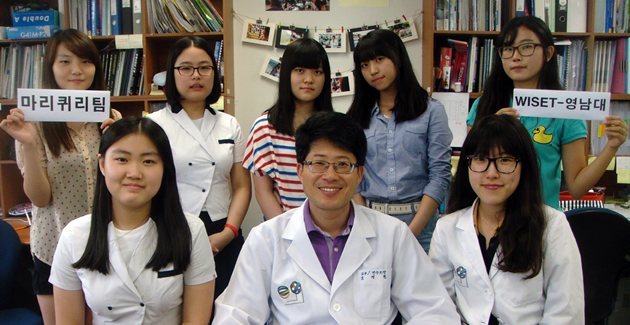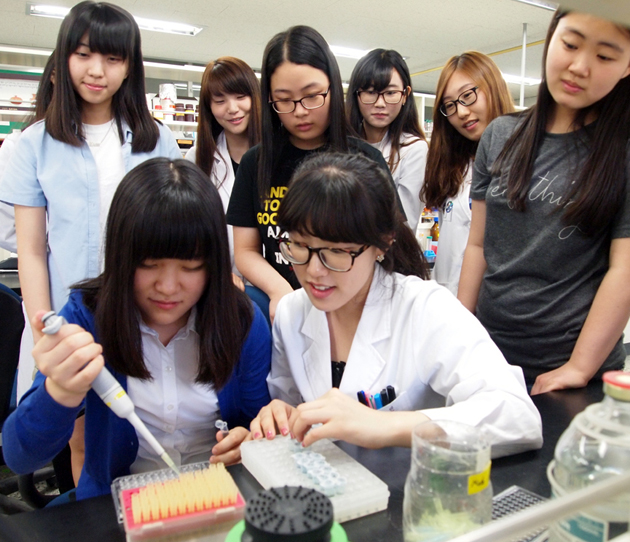School of Biotechnology 'Marie Curie' Team Wins Korean Society for Molecular and Cellular Biology Poster Award N
No.88536- Writer YU
- Date : 2012.11.07 08:53
- Views : 9789
The Team studies acrylamide's induction of arteriosclerosis and aging effects for the first time in the world
Female college student + Female high school student team are working on the project supported by WISET (Center for Women in Science, Engineering and Technology)
[October 18, 2012]
Female college student + Female high school student team are working on the project supported by WISET (Center for Women in Science, Engineering and Technology)
[October 18, 2012]

'Marie Curie' Team (team leader Kim, Sung-min, front row, right) and Advising Professor Cho, Kyung-hyun (front low, center) became the first in the world to investigate the induction of arteriosclerosis and skin aging acceleration effects of acrylamide
The 'Marie Curie' Team (Advising Professor Cho, Kyung-hyun), made up of female college students of YU and high school girls in a local high school, recently won the Poster Award at the 2012 academic conference of the Korean Society for Molecular and Cellular Biology at COEX in Samseong-dong, Seoul.
The team was made up of 3 female college students including team leader Kim, Sung-min (24, 3rd term in Master's and PhD course) of the YU School of Biotechnology, Lim, So-mang (21, junior), and Jung, Hye-ji (20, sophomore), and 4 high school girls - Lee, Hyun-jung (16) and Hwang, Ah-reum (16) who are second year students at Sunhwa Girl's High School (Yeongcheon), and Park, So-yun (16) and Han, Hye-jung (16), who are first year students at Daegu Il Science High School (Gaksan-dong, Dong-gu, Daegu).
In May, the 'Marie Curie' team was selected for the 'Research Support Project for Female College Student Team' by WISET (Center for Women in Science, Engineering and Technology) and began research on 'Observation of acrylamide's induction of arteriosclerosis and aging effects' receiving scholarships of 5 million won. 'Acrylamide' is a chemical substance used for leak stops and synthetic fiber adhesives. Recently consumption of this has grown rapidly due to the high content of carbohydrate food that are heated like fast food and french fries. It has been reported that when absorbed by the body through the respiratory system or the skin, it can cause speech disorders, peripheral neuritis and other nervous system related diseases, as well as genetic modification and cancer. However, no research has been conducted on its induction of arteriosclerosis and aging effects.
Thus, the 'Marie Curie' team raised zebrafish at Professor Cho, Kyung-hyun's lab of the YU School of Biotechnology in acrylamide solvents of different concentrations and conducted tests to be the first in the world to study the effects that it has on causing arteriosclerosis and aging through dissection and analysis.
For this, team members not only shared research information through the WISET online mentoring site, e-mail and SNS, but also met on the weekends or holidays twice a month during the semester, and every other week during vacation periods at the YU School of Biotechnology 'Biochemical Molecular Medical Lab' to conduct tests, check progress, and hold discussions.
In result, the 'Marie Curie' team discovered that acrylamide causes lipoprotein to transform and accelerate arteriosclerosis, while promoting aging of skin fiber cells. In this conference, they presented a poster titled 'Observation of the induction of arteriosclerosis and aging by acrylamide using human cells and zebrafish models'.
The results of this research are scheduled to be presented at The Gerontological Society of America Conference that will be held in San Diego in the US in November.
On such achievements, Park, So-yun (16) a first year student of Daegu Il Science High School, said, "I dreamed of becoming a scientist. So I attended various science camps since middle school. While working on upgraded tests and research with my teammates in college and graduate school at the university lab for the past several months made me feel like I actually became a scientist." She added with a smile, "I am happy to hear that the results of the research will be presented in overseas conferences as well, and I am really excited with hopes that it might be published on prominent SCI-level international academic journals as well."
Kim, Sung-min, who was the leader of the 'Marie Curie' team said, "Though there is still a lot of learning and research to do, I am very happy because it feels as though we have been recognized for our potential," while adding, "There should be many Korean female scientists who win the Nobel Award in the future. Our team will continue to work even harder so that we can partake in such honor."


※ WISET Research Support Project for Female College Student Team :
The Project provides support for research of teams in which a female student in her master's or PhD course at a science and engineering graduate school in order to enhance their research capacity and leadership, and to foster outstanding research & development human resources in the science technology sector. Meanwhile, it aims at giving high school students the opportunity to experience science & engineering programs and college students the chance to participate in in-depth research in their major.
The Project provides support for research of teams in which a female student in her master's or PhD course at a science and engineering graduate school in order to enhance their research capacity and leadership, and to foster outstanding research & development human resources in the science technology sector. Meanwhile, it aims at giving high school students the opportunity to experience science & engineering programs and college students the chance to participate in in-depth research in their major.